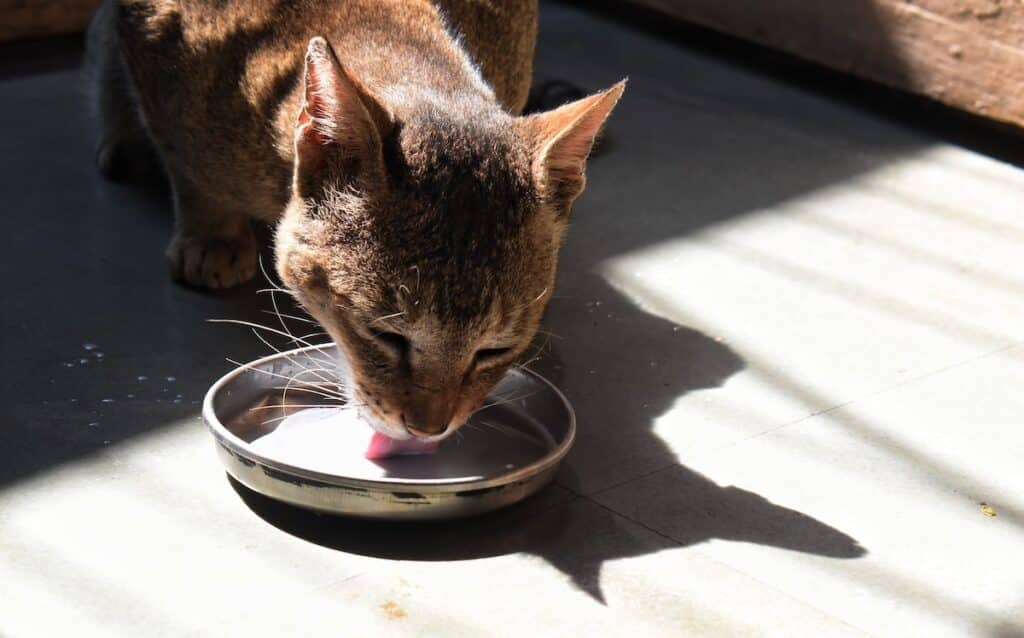Usually, if your cat suddenly starts drinking a lot of water, there may be an underlying issue that has to be addressed. However, the problem could not always be severe, therefore it’s critical to look through the list of potential causes to identify what might be going on. You may read more about some of the most typical reasons why cats drink extra water in the article that follows.
Temperature is making your cat drink a lot of water
It’s crucial to consider any potential benign underlying causes of your cat’s increased thirst before drawing any conclusions and to rule out any serious health issues. The outdoor temperature is one potential factor. It is very normal for your cat to desire more liquids on a day that is 100 degrees as opposed to, say, 30 degrees. However, as the weather cools off again after a hot day, the increased thirst should go away. Additionally, if this is the reason for your cat’s increased thirst, it shouldn’t last or get worse.
Dry food is making your cat drink a lot of water
Additionally, a change in your pet’s nutrition may make your cat start drinking more water. This is a benign issue as well, and it may be resolved by switching your cat back to the food they were eating or by simply waiting for their thirst to level out. If cats suddenly go from a diet consisting largely of wet food to one consisting primarily of dry food, they may begin to consume more water. Your cat may also drink more water to make up for the change in diet if the new food has a higher sodium content than the previous food did.
Diabetes is making your cat drink a lot of water
Cats’ excessive thirst is almost often caused by diabetes. Cats with diabetes will also have increased urination, a decrease in appetite, and an abrupt and severe weight loss. Additionally, if the illness goes untreated for too long, they might grow frail and lethargic. Your cat is more likely to acquire diabetes if they are overweight. Any cat, however, has the potential to develop this illness. Take your cat to the vet immediately away to have them checked for diabetes if their increased thirst doesn’t go away or if they otherwise seem sick.
Kidney or liver disease is making your cat drink a lot of water
There are two potential explanations of your cat consuming a lot of water: kidney or liver problems. Older cats frequently have kidney illness, which has additional symptoms include itchy skin, bad breath, and severe weight loss. Although less frequent, liver disease can cause symptoms like weakness, frequent vomiting, frequent drooling, and dark brown urine. The veterinarian must make a diagnosis of either renal or liver illness. If your cat is diagnosed with one of these conditions, the veterinarian will work with you to choose the best course of action for managing their condition for the rest of their lives.
Urniary Tract Infection is making your cat drink a lot of water
Urinary tract infections are fairly common in cats. Because their systems need to wash the infection out, cats who have a UTI may start drinking a lot of water. The good news is that after the illness is treated, your cat’s increased thirst should return to normal. To treat the issue, you will need to take them to the vet and keep them on medicine. They may also need to follow a special diet plan to avoid developing UTIs in the future.
Fever is making your cat drink a lot of water
Fever is another typical reason why cats drink a lot of water. Like people who have a fever, cats that have a fever are likely to desire to drink more water. This is due to the possibility that your cat may feel warm or slightly dehydrated and may like to drink water to replace any fluids that they are losing as a result of the fever. Even though a fever usually results in increased thirst, it’s important to identify what exactly is causing the fever. Take your cat to the doctor (or to the emergency vet if they exhibit any signs of a crisis) if they have a fever so they can be identified and treated.
What to do if your cat is drinking a lot of water
As you can see, cats’ heightened thirst can result from a variety of potentially harmful factors. Get to the bottom of this problem before it gets out of hand because even non-life-threatening conditions can become serious if left ignored. Working with a qualified veterinarian will enable you to accurately identify your cat and begin developing a treatment or management plan for her condition going ahead. The best course of action to assist deal with whatever the underlying problem is for your pet will be suggested by your veterinarian.














